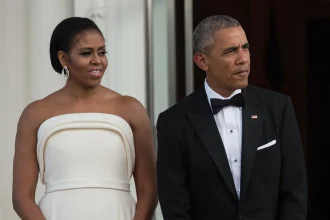The United States Supreme Court has given former President Donald Trump the green light to continue deporting alleged gang members using a rarely used wartime law known as the Alien Enemies Act of 1798.
This decision comes after a lower court blocked Trump’s attempt to deport five Venezuelan men he accused of being members of the Tren de Aragua gang. The men were meant to be sent to El Salvador on March 15, but the court said the action needed more legal review.
Trump claimed the men were part of a criminal group “conducting irregular warfare” against the United States. Based on that, his team argued he could use the 1798 law to remove them quickly without following the usual immigration process.
In its ruling on Monday, the Supreme Court cancelled the earlier court block but said the deported people must be allowed to challenge their removal in court.
“The notice must be afforded within a reasonable time and in such a manner as will allow them to actually seek habeas relief in the proper venue,” the court said.
However, the court noted that the migrants had filed their case in the wrong court—Washington DC instead of Texas, where they were being held.
Three liberal judges and Justice Amy Coney Barrett, a conservative, disagreed with the ruling. In their joint statement, they warned that the administration’s actions could “threaten the rule of law.”
Trump celebrated the decision on his Truth Social page, calling it, “A great day for justice in America. The Supreme Court has upheld the Rule of Law… to secure our Borders, and protect our families and our Country.”
The American Civil Liberties Union, which brought the case to court on behalf of the five migrants, also saw the ruling as a partial win.
“The Supreme Court said individuals must be given due process to challenge their removal under the Alien Enemies Act,” said Lee Gelernt, lead ACLU lawyer. “We are disappointed we have to restart the case in a different court, but this is still a huge victory.”
So far, 137 people have been deported under the Alien Enemies Act, a law passed during a time when the US feared war with France. It allows the president to deport or detain people from an “enemy” country, even without declaring war. The last time it was used was during World War II.
Trump’s team says all those deported are confirmed members of the Tren de Aragua gang, which he recently labelled a foreign terrorist group. The gang has been linked to serious crimes like drug smuggling, human trafficking, and killings both in South America and the US.
US immigration officials say they verified the gang ties of those deported. But some deportees have no criminal records, and their families say they were wrongly identified, mostly because of their tattoos.
One judge, James Boasberg, earlier stopped the deportations and called the government’s explanation “woefully insufficient.” But Monday’s ruling cancels that decision, allowing the deportations to continue—at least for now.
Rights groups and legal experts have called the use of the Alien Enemies Act “unprecedented” since no war has been officially declared by Congress.











